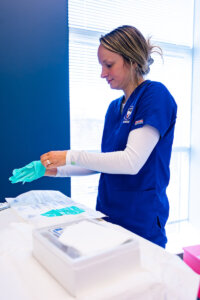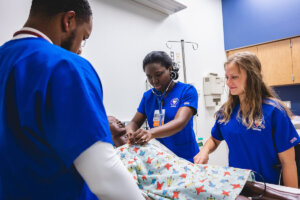Shenandoah University, Valley Health Partner To Tackle Region’s Nursing Shortage
- Category: System Happenings, Careers
- Posted On:

NextGen Nurses Program Will Use Retiring Nurses, Simulation To Train Nursing Students
Shenandoah University, in collaboration with Valley Health and the Virginia Hospital and Healthcare Association (VHHA), is working to tackle the region’s nursing shortage through a program that will enhance the training of aspiring nurses and create a sustainable pipeline of new health care professionals.
 The program, NextGen Nurses, will draw upon the expertise of semi-retired and retiring nurses to help train the next generation of nurses before they leave the profession. The program, which is designed to provide a replicable model that can be used throughout the state, will create a reliable source of new nurses in the Shenandoah Valley by increasing regional opportunities to meet clinical training requirements through preceptorship and simulation.
The program, NextGen Nurses, will draw upon the expertise of semi-retired and retiring nurses to help train the next generation of nurses before they leave the profession. The program, which is designed to provide a replicable model that can be used throughout the state, will create a reliable source of new nurses in the Shenandoah Valley by increasing regional opportunities to meet clinical training requirements through preceptorship and simulation.
This project was funded in part by GO Virginia, a state-funded initiative administered by the Virginia Department of Housing and Community Development (DHCD) that strengthens and diversifies Virginia’s economy and fosters the creation of higher-wage jobs in strategic industries.
The NextGen Nurses program is funded by a $496,000 GO Virginia Economic Resilience and Recovery Grant.
"Shenandoah University is grateful to have the support and financial backing of GO Virginia and the Department of Housing and Community Development for such a vital program during a critical period for health and nursing care in Virginia and across the country. We’re proud to partner with Valley Health on such an important endeavor to facilitate an increased nursing workforce in the region. We aim to ultimately improve the quality of life in the Northern Shenandoah Valley and provide a model to be followed across the state to help address the nationwide nursing shortage.”
Lisa Levinson, M.S.N, acting dean of the Eleanor Wade Custer School of Nursing
Workforce shortages in the health care sector were exacerbated by the pandemic, including an exodus of nursing professionals and a shortage of clinical trainers for nursing students.
As part of the NextGen Nurses program, Shenandoah University’s highly skilled faculty in the Eleanor Wade Custer School of Nursing – which boasted one of the state’s highest National Council Licensure Examination (NCLEX) first-time pass rates (97.47%) for the 2021-22 academic year – will develop a series of scalable, relevant and easy-to-use educational on-demand modules designed to accelerate training for retired nurses, and other eligible nurses, to become clinical preceptors.
"Clinical training is one of the most pressing concerns in contemporary nursing education, making this NextGen Nurses program all the more important. We are grateful for the continued partnership of Valley Health, GO Virginia, VHHA and DHCD as we collectively improve nursing education in the Shenandoah Valley. At Shenandoah University, our nursing faculty are perpetual innovators and, as such, are exceptionally well positioned to lead and partner in development of these essential modules.”
Cameron McCoy, Ph.D., Shenandoah University provost
Valley Health, with the assistance of the Virginia Department of Health, will recruit and onboard nurses who no longer work full time at the bedside to complete the SU-developed training modules before being employed as clinical preceptors.
 “This academic-practice partnership with Shenandoah University is an important element in our broader workforce development strategy,” said Theresa Trivette, DNP, Valley Health chief nurse executive. “It is critically important that we draw upon the knowledge of our most experienced nurses in the region to help train and support our newest nurses to assure we are able to continue providing the highest quality of care for our community.”
“This academic-practice partnership with Shenandoah University is an important element in our broader workforce development strategy,” said Theresa Trivette, DNP, Valley Health chief nurse executive. “It is critically important that we draw upon the knowledge of our most experienced nurses in the region to help train and support our newest nurses to assure we are able to continue providing the highest quality of care for our community.”
Additionally, NextGen Nurses will increase opportunities to use simulation as a supplemental option in clinical preceptorships. Shenandoah has hired a director of clinical simulation and obtained the necessary equipment to create a simulation lab capable of fulfilling up to 25% of the 500 clinical hours required for aspiring nurses. The simulation lab will reduce the need of SU’s School of Nursing preceptorships by 25%, relieving some of the burden on local health care providers to serve as preceptor and/or clinical sites, a role that has become more challenging due to the growing workforce shortages.
The goal of the NextGen Nurses program is to hire 35 retired or retiring nurses as clinical preceptors by June 2024.
“GO Virginia Region 8 is thrilled to provide funding for the NextGen Nurses project, addressing critical workforce shortages exacerbated by COVID-19,” said Chris Kyle, GO Virginia Region 8 chair. “Region 8 will benefit from this project, which will help rebuild capacity in the health care system as we continue to focus on this critical health care shortage in our region. We embrace the opportunity for replicable projects in the region, knowing economic prosperity will expand from high-paying career pathways. Everyone should celebrate this win!”
About Shenandoah University
Shenandoah University was established in 1875, and is headquartered in Winchester, Virginia, with additional educational sites in Clarke, Fairfax and Loudoun counties. Shenandoah is a private, nationally recognized university that blends professional career experiences with wide-ranging education. With approximately 4,200 students in more than 200 areas of study in six different schools, Shenandoah promotes a close-knit community rich in creative energy and intellectual challenge. Shenandoah students collaborate with accomplished professors who provide focused, individual attention, all the while leading several programs to be highly nationally ranked. Through innovative partnerships and programs at both the local and global level, there are exceptional opportunities for students to learn in and out of the classroom. Shenandoah empowers its students to improve the human condition and to be principled professionals and leaders wherever they go. For more information, visit su.edu.
About Valley Health
Valley Health is a nonprofit health system serving a population of more than 500,000 in the Northern Shenandoah Valley of Virginia, the Eastern Panhandle and Potomac Highlands of West Virginia, and western Maryland. As a health care provider, employer, and community partner, Valley Health is committed to improving the health of the region. The system includes six hospitals, more than 70 medical practices and Urgent Care centers, outpatient rehabilitation and fitness, medical transport, long-term care, and home health. For more information, visit valleyhealthlink.com.


